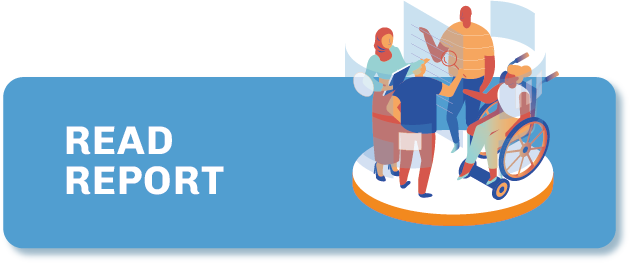Portugal
A large proportion of independent media outlets created in Portugal over the last decade address – as their unique focus or as an ever-present concern – two main themes: the issues of race and gender identity. Eight of the outlets included in the directory dedicate their coverage to culture and the arts specifically, making this the biggest group in the pool of Portuguese independent media outlets researched as part of Project Oasis.
GENERAL INFORMATION
Press
freedom
ranking
Internet
penetration
POPULATION
Media organisations
in the Directory
TYPE OF COVERAGE

TYPE OF ORGANISATION

GENDER OF FOUNDERS

Press freedom
Portugal ranks highly in terms of freedom of the press and is one of the top-ranked countries on Reporters Without Borders’ Press Freedom Index 2022, but the country’s media sector is not immune to political and judicial pressures and other attacks. The whistleblower Rui Pinto has been on trial following his arrest in 2019, accused of leaking football secrets (the Football Leaks investigation) as well as the financial records of Isabel dos Santos, daughter of the former president of Angola José Eduardo dos Santos (the Luanda Leaks investigation), notes Reporters Without Borders. In 2021, Portuguese media revealed how several journalists had secretly been monitored by the police in order to uncover their confidential sources.
Across newsrooms, several journalists have cited low wages, the precariousness of their work and a lack of newsroom autonomy regarding organisations’ administration and boards as the biggest threats to press freedom in Portugal. Meanwhile, an academic study found that 56.3% of journalists reported earning less than €1,000 per month, and 14.8% declared they were paid below minimum wage or nothing at all, notes Mapping Media Freedom, which documents press and media freedom violations across Europe.
Market structure and dominance
The Portuguese media market is essentially controlled by five major media groups, both private and public, all of which own different types of media companies. The press sector is characterised by a large number of local and regional newspapers and magazines and few national generalists, as well as a constant decline in circulation rates over the years, according to Media Landscapes analysis. Portugal has more than 300 radio stations all over its territory and the medium is popular in the country, it notes. Television dominates the media sector, receiving the largest share of advertising investment, it adds. In the online space, the major actors have been some of the top players in the offline media world, as well as news aggregators, which enjoy vast popularity among the public.
How media is funded
The Portuguese media system still relies on advertising as its main source of funding, with television absorbing the greatest share of investment. In 2020-2021, Covid-19 restrictions affected the media sector negatively, with a decline in print circulation and advertising losses. All of this affected journalists’ salaries which “have been devalued”, according to Reporters Without Borders. In 2021, there was a 16.9% increase in digital subscriptions, according to the Reuters Institute’s Digital News Report Portugal 2021 – although according to its Digital News Report for 2022, payment for news online “remains relatively low at 12%” in 2022. In November 2021, the Google News Showcase was also extended to Portugal, establishing partnerships with 49 publications.
Twenty-one profiles of digital native media organisations from Portugal are included in the directory. Most of these organisations were created as a response to the difficulty some journalists faced in finding their place inside traditional outlets, or as a response to the feeling that certain topics were underreported. Issues of racism, gender identity and inequality, as well as culture and the arts, are among the main focuses of these organisations.
More than half of the media outlets researched relied on the team’s or the founder’s initial financial investment to start up, as well as on voluntary work to survive. Consultancy and content services are important means of transferring revenue between different projects owned by the founders, or between different branches of the same project. Institutional funding, reporting grants, advertising and partnerships with private companies constitute other sources of revenue. Few outlets report relevant revenue sourcing from audience support.
In general, independent media outlets are looked at with curiosity by traditional newsrooms, which often quote them, broadcast or publish their stories and investigations, and work in collaboration with their journalists. Some independent projects have been granted national and international awards and distinctions. This has contributed to these outlets being considered as relevant, as well as sources of inspiration and learning.
In 2022, the publication of a spreadsheet listing wages across the Portuguese journalism industry, released by a group of journalists who have remained anonymous, allowed media professionals to realise just how low wages in the sector were. One of the most unexpected aspects of the spreadsheet was the fact that journalists of independent media outlet Fumaça were paid higher-than-average wages. “We could choose to pay lower wages and guarantee the functioning of our newsroom for longer, but we have decided to pay our team decently because we believe it doesn’t make sense to investigate precariousness and then not practise what we preach,” says Maria Almeida, one of the founders of Fumaça.
In the last 10 years, dozens of independent media outlets have cropped up in Portugal, most of them in the aftermath of the financial crisis of 2011-2014, which saw newsroom layoffs, budget cuts and disinvestment in journalistic coverage, as well as an increase in work precarity across newsrooms. In general, journalists who have founded independent media outlets report greater creative satisfaction in their work, a sense of freedom, as well as a sense of community and camaraderie among the teams they have chosen. The greater challenges reported by these teams have to do with finding structural funding that benefits the southern European region, knowing how to access grants and funding opportunities, and knowing how to correctly apply for them.
Last updated: December 2022
CREDIT FOR STATISTICS: Press Freedom statistics, RSF Press Freedom Index 2022; Internet penetration and population statistics, from Internet World Stats

